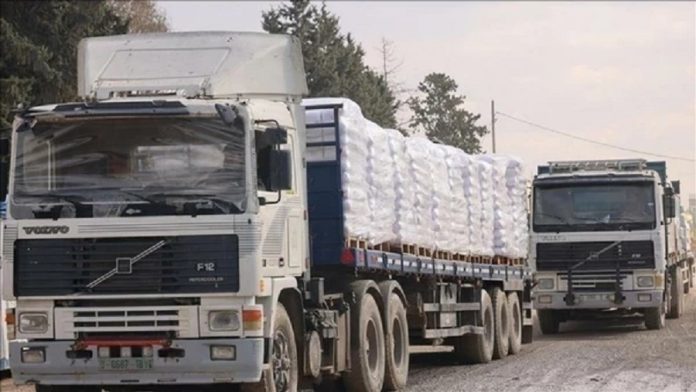Over 100 international organizations have reported that the majority of them have been unable to get any humanitarian aid trucks into the Gaza Strip since last March, according to a report today from the Israeli newspaper Haaretz.
The organizations, which operate in Gaza and the West Bank, said that despite the government’s announcement last month that it would allow goods to enter, Israeli authorities are blocking aid from reaching the people who need it. In just one month, there were more than 60 rejections for aid to enter, leading to millions of dollars worth of water, medicine, food, and tent materials being held in warehouses in Jordan and Egypt, while Palestinians suffer from a severe shortage of food and basic necessities.
The groups pointed out that a new procedure, which went into effect in March, requires all organizations to register with a joint ministerial committee headed by the director-general of the Ministry of Diaspora Affairs. The committee set criteria that could allow for the rejection or cancellation of registration, including political activities, calls for a boycott of Israel, or accusations of delegitimizing the state.
The procedure also requires organizations to provide detailed information about their international employees and their family members, which the organizations considered a violation of privacy laws in the European Union and their home countries.
The organizations, including Doctors Without Borders, the Norwegian Refugee Council, and Oxfam, expressed concern that this procedure is intended to monitor and silence them and censor humanitarian reports. They called on supporting countries and donors to pressure Israel to immediately open the crossings and allow humanitarian aid to enter without restrictions.
Yotam Ben Hillel, a lawyer representing the Association of International Development Agencies (AIDA), explained that the new procedure imposed by Israel on humanitarian organizations is populist and aims to persecute groups that have been working in the Palestinian territories and the Gaza Strip for decades without their activities having been subject to any prior criticism.
He added that the Ministry of Diaspora Affairs and the committee it formed are seeking full control over these organizations, even those that adhere to neutrality and professionalism in accordance with international law, stressing that “this is unprecedented in the world.”
Ben Hillel noted that the organizations are legally obligated to protect the privacy of their employees’ information, according to strict legislation in their home countries and the European Union, which makes the transfer of the required data unsecured. This puts them in a critical position: if they provide the information, they may face large penalties and fines in their countries, but if they refuse to provide it, Israel may prevent their humanitarian activities in Gaza, the West Bank, and East Jerusalem. Israel has also demanded the expulsion of all employees of the organization if they are not approved within three weeks.
Ben Hillel considered this procedure to be another abdication of Israel’s obligations under international law and reflects a complete abandonment of the residents of Gaza who are in desperate need of food, medicine, and shelter.























